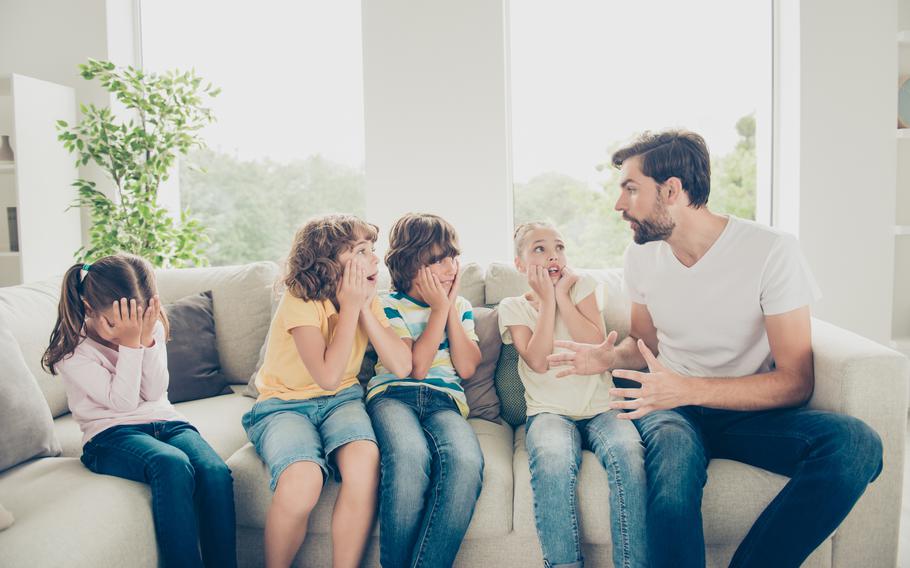
Parents of the past - and perhaps the present - have resorted to protecting their children through fear at times. (iStock)
My adult son stopped at the house to bring me a little Mothers’ Day gift. After a while, we began reminiscing about his childhood.
“I probably traumatized you,” I said jokingly, fully expecting my son to emphatically deny any trauma, and assure me that I was a wonderful parent who raised him and his sisters with unconditional love, serene patience and thoughtful guidance.
“It wasn’t really what you did that traumatized me, but rather how you explained things,” Hayden said.
“What?” I responded, giggling but surprised. “What did I say?” I braced myself for criticism, but was sure Hayden must’ve been mistaken.
Hayden recounted a day in 2003 when Hurricane Isabel had knocked the power out in our Virginia Beach neighborhood, and our family was watching the mayhem out the living room window. When a squirrel’s nest blew from a tree in our backyard, the mother was panicked, dashing and squeaking to gather up her babies.
“You were narrating, telling us that the mother squirrel had left one baby behind, and that it could die alone in the storm,” Hayden said.
“I said THAT? So that’s why you were sad and wouldn’t talk to me for hours?” I remembered my 7-year-old son burying his face in the couch cushions.
“And there was that time,” Hayden went on, remembering more trauma caused by his well-intentioned mother, “when the girls were doing something bad, and I overheard you telling them about two sisters that had died when they accidentally got locked in a trunk. I couldn’t sleep, and you came into my room that night because I was crying,” Hayden recalled.
“I can’t believe I made you cry!” I said, mortified. I tried to explain why I’d made such obvious parenting blunders. “When I was a child, it was normal for parents to use fear to protect kids. There were no seatbelt laws, so our parents told us that if we put our arms outside the car windows, a passing truck would rip them off. We were told that if we hid inside of refrigerators or trunks or cabinets, we’d suffocate. They said if we drank anything from bottles under the sink, we’d die a painful death. They said if we ran in the grass barefoot, we’d get worms. It was scary, but it worked.”
A spotlight had been turned on my parenting skills and I suddenly felt insecure and defensive. Was I really a bad mother, or did I just have a lousy way of communicating? Did my efforts to protect my children inadvertently traumatize them, or are millennials and Gen Zers prone to dramatics? Will my children spend thousands of dollars in therapy to reverse the damage that I caused them, or will they commit the same transgressions when they become parents themselves?
A few days later, I told Hayden’s story to my middle child, Anna, and a few of her 20-something friends in hopes that they’d deem his claims of trauma as bogus, and applaud my well-intentioned mothering skills. Instead, each of them piped up with their own trauma stories.
“My dad said if I turned the lights on in the car while he was driving that we’d all die in a crash.”
“My mom put a lock on the snack cabinet so I couldn’t sneak food.”
“My mom didn’t tell me about the birds and the bees, so I had to ask the neighbors.”
The conversation went on for over an hour, with each girl describing the grave wrong-doings their parents committed. Despite these heinous crimes of parenting, no one had ever called Child Protective Services, required medical attention or sought therapy for mental distress caused by these events.
In fact, we all chuckled about their benign, and even charming, childhood recollections spun as traumatic experiences. The comical absurdity of the younger generation’s early-life “trauma” stories made me realize that less-than-stellar parenting decisions are often conflated as trauma in today’s world, because victimhood is a necessary element of social status.
Even though my own childhood fears still prevent me from swallowing gum, peeing in pools and sitting too close to the TV, I’ll rest easy knowing that my children’s “trauma” is heavy on drama.
Read more at themeatandpotatoesoflife.com and in Lisa’s book, “The Meat and Potatoes of Life: My True Lit Com.” Email: meatandpotatoesoflife@gmail.com